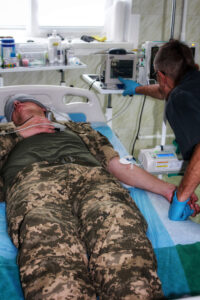Research of the new treatment for PTSD
 We want to understand more about the trauma of war and its impact on mental health, which is why we support research. Our long-term goal is to introduce new treatments for PTSD and anxiety-depressive disorders suffered by civilians and veterans injured in war, especially those who do not respond to conventional treatment.
We want to understand more about the trauma of war and its impact on mental health, which is why we support research. Our long-term goal is to introduce new treatments for PTSD and anxiety-depressive disorders suffered by civilians and veterans injured in war, especially those who do not respond to conventional treatment.
That is why we are launching a clinical trial with Expio Medical Centre, a leading Ukrainian health organisation in the development of the latest methods for restoring mental and psychosomatic health:
“A single-centrered, randomised, double-blind, placebo-controlled clinical trial of ketamine-assisted integrative psychotherapy in military veterans with treatment-resistant post-traumatic stress disorder (PTSD)”.
The stydy is registered with the Ministry of Health in accordance with the requirements for clinical trials.
Background
Based on available statistics, it is estimated that millions of people in the country, particularly those affected by the war, are living with mental disorders, including Post-Traumatic Stress Disorder (PTSD).
PTSD is a highly challenging chronic condition, with many patients experiencing symptoms even after 20 years since the trauma occurred. The incidence of PTSD often worsens over time following the traumatic event. It is reported that the lifetime prevalence of PTSD among veterans is 15-20% or more.
Despite the debilitating nature of PTSD and its high incidence among veterans, the available therapy options remain limited. There are several empirically validated psychotherapeutic treatments for PTSD, among which the most effective are trauma-focused cognitive behavioral therapy and eye movement desensitization and processing therapy. However, psychotherapeutic treatments have a significant percentage of unresponsive patients. A number of pharmacotherapies have also been proposed, where selective serotonin reuptake inhibitors such as paroxetine and sertraline have shown the greatest success. Unfortunately, pharmacotherapy has an even higher non-response rate than psychotherapy, as well as numerous side effects. Meta-analytic studies show only minor differences between pharmacotherapy and placebo, especially in veterans suffering from PTSD. As a result, a significant proportion of PTSD patients remain treatment resistant. Taken together, these data underscores the urgent need for new effective treatments for this disorder.
One promising approach is ketamine psychotherapy. However, due to current Ukrainian laws, state-funded medical institutions, including military hospitals, do not practice Ketamine-assisted therapy because it is not included in national PTSD and depression treatment protocols. As a result, only a few individuals from our highest-risk population have access to this potentially transformative intervention in private clinics.
This research study could pave the way for legislation that would allow state-funded medical institutions to offer Ketamine-assisted therapy.
Aim and Objectives:
The aim of this project is to introduce new methods of treatment of mental health disorders for those Ukrainian citizens affected by war who cannot get benefit from standard first-line therapy (treatment-resistant).
The objectives include:
• Examining if the integrative approach (ketamine-assisted psychotherapy) will be more efficient than control therapy (see below).
• Assessing the durability of treatment effects over time
• Examining the impact of treatment on patients’ overall functioning and quality of life
• Identifying any potential side effects or adverse events associated with treatment.
Description of the study
This project will involve military veterans with diagnosed treatment-resistant PTSD related to war trauma.
Patients will be recruited through referrals from mental health providers and outreach to community and veteran organizations. For those who meet the eligibility criteria, this study will essentially be a free treatment using the latest method for 4 to 5 weeks.
Participants will be divided into an experimental and a control group. Both groups will receive almost the same therapy, except for the drug used during psychotherapy. The groups will then be rotated.
The experimental group will receive ketamine 0.5 mg/kg intravenously in combination with psychotherapy, twice a week, and one session of integrative psychotherapy between ketamine sessions, lasting 50 minutes, and the control group will receive midazolam twice a week and one session of integrative psychotherapy between ketamine sessions, lasting 50 minutes. At the end of the 4-week therapy, patients in the control group who did not show an improvement of more than 20% from the baseline value of the severity of post-traumatic symptoms will be transferred to receive ketamine therapy. Patients who receive 4 weeks of ketamine-assisted integrative therapy will be included in the 3-month follow-up period.
Outcome measures will include assessments of symptoms of PTSD, depression, and anxiety, as well as measures of overall functioning and quality of life.
Why Ketamine?
Ketamine (chlorphenyl-methylamine-cyclohexanone) is a licensed medical drug and has been widely used worldwide as a short-acting anesthetic and analgesic for more than 40 years.
Research on ketamine as a treatment for mental disorders began in the 1970s in Argentina and Mexico and has since spread to other countries. Since the beginning of the 21st century, after the resumption of research on psychoactive substances, there has been a significant increase in the number of scientific publications devoted to the use of ketamine for the treatment of depressive disorders and pain syndromes. In microdoses, it has a pronounced psychotropic therapeutic effect that differs from the standard doses used in surgical anesthesia to “turn off” consciousness.
Studies show that ketamine increases the neuroplasticity of the brain, helping to regenerate synaptic connections between brain cells damaged by stress and depression. This can be particularly helpful for veterans who often have post-concussion syndrome as a condition comorbid to PTSD. The drug acts at a completely different level of the neurotransmitter system compared to the traditional antidepressants that now exist. In contrast, even a single injection of ketamine usually has a significant and rapid antidepressant effect on patients with persistent depression resistant to other medications, as well as reducing PTSD symptoms.
In March 2019, the U.S. Food and Drug Administration (FDA) approved the use of ketamine to treat depression, and the European Commission did the same in December 2019. According to Ronald Duman, professor of psychiatry and neurobiology at Yale University, “The rapid therapeutic response of ketamine in treatment-resistant patients is the biggest breakthrough in depression research in a half-century”. That is why the number of ketamine therapy centers around the world is rapidly increasing, and today there are already several hundred in the U.S. alone.
Following the use in depression, scientific evidence emerged on the effectiveness of ketamine for increased anxiety, PTSD, obsessive-compulsive disorder, emotional burnout, long-term pain syndromes, alcohol and drug addiction and other pathologies.
Several reviews and meta-analysis published in 2021-2022 and studied 10 to 14 research studies of ketamine to treat PTSD, covering a total of 1107 patients, have found that the drug can significantly alleviate the symptoms of chronic PTSD. Repeated injections of ketamine are safe for patients with chronic PTSD and are generally well tolerated, with brief psychiatric and hemodynamic side effects.
The combination of ketamine with psychotherapy is particularly effective. Depending on the dose, ketamine promotes a shift from conventional, habitual thinking, to more creative thinking, a release of emotional negativity, and an expansion of consciousness with deeper access to the self in terms of self-knowledge. These effects enhance the patient’s ability to engage in meaningful psychotherapy during and after the administration of the drug. Ketamine is effective for “resetting” consciousness, introspection and meditative presence, as well as for recovery from depression and the lingering effects of trauma.
Why Expio?
Expio Center for Psychotherapy, Psychosomatics and Psychedelic Medicine is the first clinic in Ukraine that started Ketamine-assisted psychotherapy in 2018.
Founder and the head of the Center, Vladislav Matrenitsky MD, PhD, certified as transpersonal psychotherapist by international EUROTAS Association (Vienna) and in 2022 completed the Advanced course of Ketamine and Psychedelic-Assisted Psychotherapies in Polaris Insight Center (USA). He is also co-founder of Ukrainian Psychedelic Research Association (UPRA).
Expio clinic treat both civilians and military and got excellent results, which were featured in The Economists, Business Insider, Time Magazine, France24, Arte TV, Deutsche Welle, etc.
How you can help
We are seeking an initial grant of $68,400, which would have a significant impact in three key areas:
- Provide a powerful and much-needed treatment for 50 military veterans.
- Create a formal and empirical research report that documents the findings of the study.
- Unlock larger institutional delivery models to scale up this effective treatment modality.
Your contribution will not only help alleviate the suffering of those with PTSD but also contribute to the overall well-being and mental health of our society by making this treatment widely accessable. Together, we can make a lasting impact and provide hope for a better future.
Should we are able to raise more funds, it will allow us to increase the number of subjects and thus increase the validity of the study.
We invite you to make the donation HERE.
